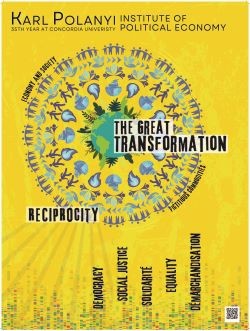- Repository of the Karl Polanyi Archive and archival support
- Participate in research projects at home and abroad
- Host seminars and webinars on significal theoretical debates in the social sciences and humanities
- Host International Polanyi conference (Canada and Abroad)
- Contribute to the dissemination of literature on and/or influenced by Karl Polanyi
About the Institute
Our mission
To preserve the intellectual legacy of Karl Polanyi and to contribute to research and policy debates on new development strategies locally and internationally and on the new or reformed multilateral institutions required for the global order.
What we do
 Poster of celebration of 35 years at Concordia.
Poster of celebration of 35 years at Concordia.
The Karl Polanyi archive
The centrepiece of the Institute is the Karl Polanyi Archive. The collection, an important contribution to the historical legacy of the social sciences and humanities, includes published and unpublished material in Hungarian, German, and English, dating back to 1919, as well as Polanyi's lifetime correspondence with important European intellectuals and political figures.
In April of 2014, the Institute launched the Karl Polanyi Digital Archive to commemorate the 50th anniversary of Karl Polanyi’s death and the 70th anniversary of the publication of his seminal work, The Great Transformation. An open source library and information management system provides free access to the digital collection.

